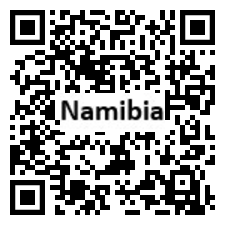Travel Facts
US State Dept Travel Advisory
The US Department of State currently recommends US citizens exercise normal precautions in Namibia. Consult its website via the link below for updates to travel advisories and statements on safety, security, local laws, and special circumstances in this country.
https://travel.state.gov/content/travel/en/traveladvisories/traveladvisories.html
Passport/Visa Requirements
US citizens should make sure their passport will not expire for at least 6 months after they enter the country even if they do not intend to stay that long. They should also make sure they have at least 6 blank pages in their passport for each entry stamp/visa that will be required. A visa is required. A visa is available planeside for tourists for up to 90 days.
US Embassy/Consulate
(264) 061-295-8500 ; EMER: +(264)(85) 686-0853; US Embassy Windhoek, 14 Lossen Street, Windhoek, Namibia; ConsularWindhoek@state.gov; https://na.usembassy.gov/
Telephone Code
264
Local Emergency Phone
Ambulance: 2032276; Fire: 2032270; Police: 1011
Vaccinations
An International Certificate of Vaccination for yellow fever is required for travelers arriving from countries with a risk of yellow fever transmission and for travelers having transited through the airport of a country with risk of yellow fever transmission. See WHO recommendations.
http://www.who.int/
Climate
Desert; hot, dry; rainfall sparse and erratic
Currency (Code)
Namibian dollars (NAD)
Electricity/Voltage/Plug Type(s)
220 V / 50 Hz / plug types(s): D, M

Major Languages
Oshiwambo languages, Nama/Damara, Kavango languages, Afrikaans, Herero languages, Zambezi languages, English, other European languages
Major Religions
Christian 80% to 90% (at least 50% Lutheran), indigenous beliefs 10% to 20%
Time Difference
UTC+1 (6 hours ahead of Washington, DC, during Standard Time); daylight saving time: +1hr, begins first Sunday in September; ends first Sunday in April
Potable Water
Yes, but some opt for bottled water
International Driving Permit
Suggested
Road Driving Side
Left
Tourist Destinations
Etosha National Park; Fish River Canyon; Sossusvlei; Cape Cross; Swakopmund; Caprivi Strip; Twyfelfontein; Namib-Naukluft National Park; Kalahari Desert; Chobe River
Major Sports
Soccer, rugby, cricket, golf
Cultural Practices
In professional settings, people are often referred to by their surnames; it is considered informal to use first names immediately.
Tipping Guidelines
At hotels, tip about 30 Namibian dollars per guest per day. Leave your tip in a communal tipping box. If you would like to tip porters, 10 Namibian dollars is recommended. For specialist guides, tip 50 Namibian dollars per guest per day.
Souvenirs
Stone and wood carvings, karosse woven rugs, woven palm baskets, Herero dolls, diamond/precious gem and beaded jewelry, swakara woolen clothing and swakopmunder leather shoes
Traditional Cuisine
Meat and pap — pap (a traditional porridge made from ground maize or pearl millet) served with meat, cabbage, or fish
Please visit the following links to find further information about your desired destination.
World Health Organization (WHO) - To learn what vaccines and health precautions to take while visiting your destination.
US State Dept Travel Information - Overall information about foreign travel for US citizens.
To obtain an international driving permit (IDP). Only two organizations in the US issue IDPs:
American Automobile Association (AAA) and American Automobile Touring Alliance (AATA)
How to get help in an emergency?
Contact the nearest US embassy or consulate, or call one of these numbers:
from the US or Canada - 1-888-407-4747 or from Overseas - +1 202-501-4444
Page last updated: Wednesday, October 05, 2022
